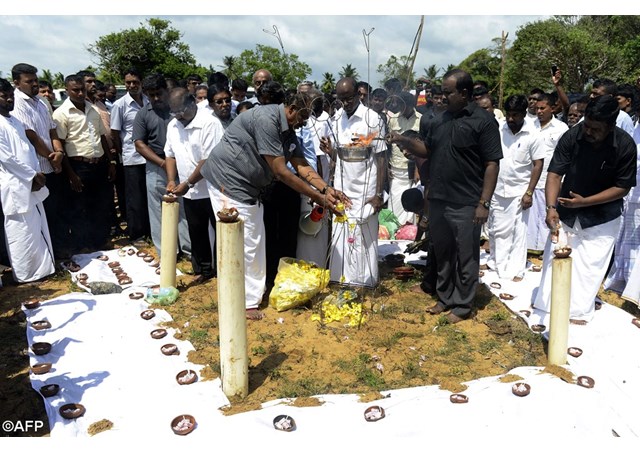
Victory Day observed as Remembrance Day in Sri Lanka

(Vatican Radio) The new Sri Lankan government, which has pledged to achieve reconciliation among the communities, observed May 19, which was marked as the Victory Day for the last five years, as a 'Remembrance Day' to commemorate all who died in the war.
Since the war against Tamil Tiger terrorists ended on May19, in 2009, the day was celebrated as a day of triumph and victory achieved by the security forces against terrorism. The Tamil community in the north and east was prevented from any attempts at public memorials. Political party offices and media institutions were surrounded by government troops and roads to some Hindu religious shrines closed in order to deny any attempts at commemoration.
However, this year, Cabinet spokesman Minister Rajitha Senaratne had told the media last weekend that May 19, which was celebrated as ‘Victory Day’ during the Rajapaksa era will from this year onwards be observed as ‘Remembrance Day’ to recall the sacrifices of all those who had fought to maintain the unity and integrity of the country irrespective of their ethnicity.
However, there was also a military parade held in Matara in the south under the patronage of the President Maithripala Sirisena as the Commander-In-Chief. But it was observed as a War Heroes Commemoration Day as well as a civilian Remembrance Day.
Maithripala Sirisena said the truth of what happened in the conflict needed to be established and justice delivered. "We were all happy when the war ended. But can we be happy with the developments post-war?" Mr Sirisena said during commemorations on Tuesday.
"We were not able to win hearts and minds of people. The true reconciliation could only be achieved by winning hearts and minds," He said
As a result, this year, the government did not stop ceremonies in the country’s northern and eastern provinces on ‘Remembrance Day’. In Mullivaikkal, an interfaith gathering provided a venue for "consolation and comfort", although "political solution to the Tamil problem" is still needed.
On Monday for the first time Tamil politicians in the former war zone in the north and east were allowed to hold a memorial event for dead civilians. However, police surveillance was high. Other demonstrations were banned.
Monday's memorial event by Tamil politicians was a notable change. The ceremony was conducted on the beach of Mullivaayikkal in Mulaithivu district where the final battle took place. The ceremony was attended by the Chief Minister of the Northern Province CV Vignaswaran and many other members of the provincial council. Several other religious events were held throughout the north and east to commemorate the civilian lives lost.
On 18 May 2009, Velupillai Prabhakaran, founder and leader of the Liberation Tigers of Tamil Eelam (LTTE), was killed by a special unit of the Sri Lankan Armed Forces. His death brought to an end 30 years of ethnic conflict.
During those many years, Tamil civilians paid the heaviest price in the country’s northern and eastern provinces. Even today, they complain of discrimination by the authorities and the absence of a genuine process of reconciliation.
Mr Sirisena says he wants reconciliation, but rights campaigners remain to be convinced. Mr Sirisena's remarks, however, are another sign of a changed emphasis since his unexpected election victory over the more nationalistic former president, Mahinda Rajapaksa, in January, reports the BBC's Charles Haviland.
Mr Sirisena appears to be acknowledging that more remains to be discovered about how many Tamil civilians died or disappeared in murky circumstances - and about whether Tamil Tiger leaders were killed after surrendering.
According to UN estimates, between 80,000 and 100,000 people were killed in the conflict. Some reports have suggested about 40,000 Tamil civilians may have been killed in the final few weeks.
Peace campaigners have repeatedly warned against major victory celebrations that could further alienate the country's communities.
For some war widows, who talked to AsiaNews, this is “a consolation that soothes a bit the pain even though reconciliation is still difficult."
In Mullivaikkal, an interfaith service was held, followed by Mass. Saravanamuttu Manimekala, a 30-year-old Catholic woman with three children aged 10, 8 and 7 years, spoke to AsiaNews.
Her husband died before her eyes, killed by a bomb attack at their church in Walayamadam. She also lost her parents. Today, she has to do odd jobs to support her children and send them to school.
"For the first time, we had a chance to cry in freedom for our loved ones and this made us happy. However, our pain cannot yet lessen. We need a political solution to the Tamil problem. Only when it is found can we really start again, even if the suffering will never go away."
Indeed, "So many times I thought about suicide but the thought of my children kept me alive,” Manimekala said. “I want to go forward for them, to make them good human beings."
Suharthi Krishnagopal, 50, also lost her husband own in the final stages of the conflict. Now she is alone, with her two children, in charge of a small shop in the same house where she lives.
For her, Remembrance Day was "a moment of great consolation and comfort. We know that our loved ones will never come back, but it is important to remember them."
The same goes for Chandrasekaran, a Catholic man. Speaking to AsiaNews, he remembered his wife and two children. "We had a good life,” he said. “Then we experienced terrible destruction. I keep wondering why God saved only me, and I try to understand what my place in the world is".
Mr Rajapaksa and his supporters commemorated the war anniversary separately on Monday and blamed the new government for not celebrating it as a victory.
(Source: BBC, AsiaNews, ColomboPage)
| All the contents on this site are copyrighted ©. |


